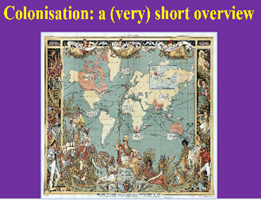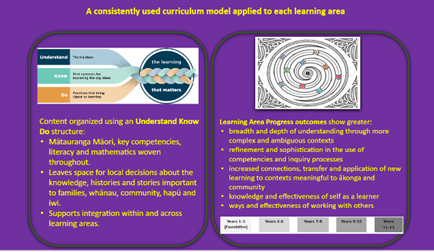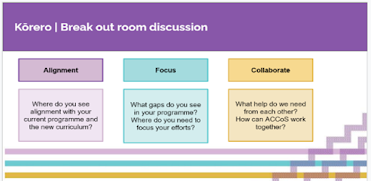Friday 3rd June 2022
Introduction
The implementation of the ‘Te Takanga o Te Wā’, (Aotearoa New Zealand’s Histories) aspect of the Social Sciences curriculum in 2023, was the kaupapa for an across Schools hui. This was an opportunity to implement the ACCoS whakataukī Waiho i te toipoto, kaua i te toiroa, Let us keep close together, through learning about the curriculum and what is means for Schools in our Kāhui Ako.
This was followed by mihi and a setting the scene for the day by the Principal of Epsom Girls Grammar, Lorraine Pound. She introduced Graeme Ball, the presenter for the hui. Graeme is the Chair and Kaiārahi of NZ History Teachers’ Association, part of the Curriculum Writing Group and Head of Faculty (Social Sciences), Northcote College, Auckland
The
pairing of Zoom and the Slide Show worked effectively for participants across
the rohe (district), with participants being able to view the documentation and
slides on personal devices as they listened and viewed Graeme presenting.
Graeme Ball’s plenary
Graeme,
set the scene with a journey through NZ history.
“The Māori are our
largest purveyors of foodstuffs; so large indeed as nearly to monopolise the
market and to exclude Europeans from competition.”
“Māori
were described as the ‘life blood’ of the Auckland settlement, with a newspaper
noting that ‘it is likely that but for the Māori
trade Auckland business would have collapsed during these years.’”
After this historical journey Graeme presented a Challenge:
Te Wero
Before we get into the Histories’ curriculum overview
presentation, there are a few important points to keep in mind:
●
Properly done, the goal of History is to explain/interpret the evidence, not to blame or shame. It’s not
about identifying ‘heroes’ or ‘villains’ and it is not about a recitation of
names and dates!
●
We may well make ethical judgments about what people did in the past,
but we must do so based on a wide range of evidence and with an awareness of
the context of times.
●
History can be challenging as we learn new and uncomfortable
things; as kaiako we need to be aware of the potential impacts on our ākonga.
Over the next 20 minutes Graeme
outlined the organisation and structures of the document. He
demonstrated how it wove the connections between Understand, Know and Do with examples
from past and present and Global, National, Rohe and local events and knowledge.
The examples provided, demonstrated how the contexts are underpinned by Mātauranga Māori, critical literacy and thinking skills. This reiterated how the relevance of this learning is enhanced from being integrated across the Curriculum and being grounded from the stories and knowledge of the local rohe, whenua and Community.
Collaborating across Schools and Learning Disciplines
Teachers from Epsom Girls Grammar split in groups based on their learning areas and dug deeper into how the curriculum may apply in their subject area and for the students they teach. Their focus was ‘Think about learner experience and Mātauranga Māori in your subject area’.
Teachers in these groups split into breakout rooms. The groups of people, from a number of schools, discussed the questions and added their contributions to Jam boards.
The visibility and sharing of ideas, questions and actions across schools was another highlight of the day, and evidence of the Kāhui Ako whakataukī, Waiho i te toipoto, kaua i te toiroa, Let us keep close together not far apart, in action.
Kura korero (Schools discussion groups)
Teachers then moved into school discussion
groups, some on site others on zoom. The
discussion in school ropu were
facilitated by principals and school leaders.
Poroporoaki (Farewell, conclusion of a hui)
The poroporoaki brought the focus back to the hall at
Epsom Girls Grammar. The Principals shared their key take outs from their
school discussions through zoom and Graeme Ball addressed the group with
observations and some suggestions for next steps.
Kupu Whakamutunga (Final words)
Kaumatua Richard Maihi rounded off the day, drawing
together observations on the curriculum, the acknowledgement of mana
whenua and the process of the day,
before concluding with karakia.
Where to now
This was a successful and highly engaging morning of
learning and collaboration both on site and on zoom. Although the move to an on-line and in
school settings was a disappointment to the anticipation of being kanohi ki te
kanohi as a Kāhui Ako, the day achieved the kaupapa. The negative of not being together, was off set by the efficiencies of
being line and in smaller groups on sites across the motu. The organisational
format was easy to follow and successfully allowed people to log into the
different zoom sessions, talk with others from across the Kāhui Ako and share
knowledge and ideas. The organising
group have collated the contributions and discussion boards and will use this
information to feedback to Principals
and Across School Leaders.
With the uncertainty of Covid-19 still in the
Community, this model for learning was an effective way to run professional
development and collaborate across a large group of schools and kaiako. Thank you to
Graeme Ball, the kaumatua Richard
Mahi, the organising committee and support from staff at Epsom Girls Grammar for
your foresight and work to bring this day to fruition
ACCoS, (2022) Launching the Aotearoa New Zealand Histories Curriculum. Auckland June 2022


















